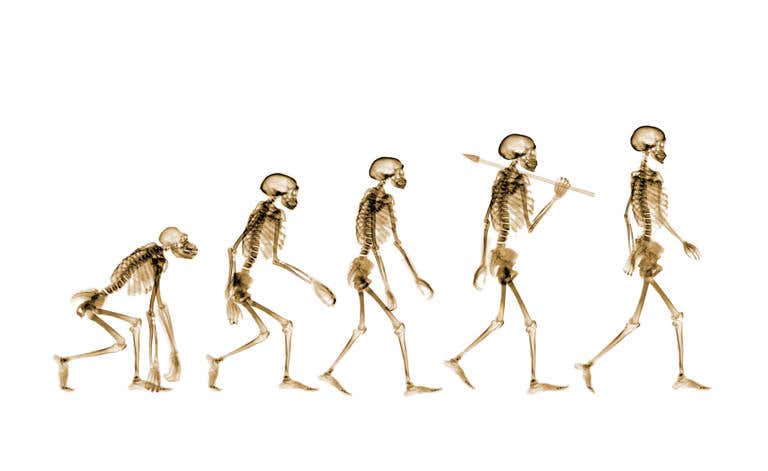Surprising research finds that human ancestors may have evolved in Europe, not Africa
A groundbreaking discovery evolutionize our understanding of the origins of apes and humans challenging the long-established theory.

[Sept. 4, 2023: Staff Writer, The Brighter Side of News]
A groundbreaking discovery evolutionize our understanding of the origins of apes and humans (CREDIT: Nick Veasey)
In what can only be described as a groundbreaking discovery, a recent find of an ancient ape skull in Cankiri, Turkey, may revolutionize our understanding of the origins of apes and humans, potentially challenging the long-established theory that our shared ancestry lies in Africa.
This partial skull belongs to an ape species, named Anadoluvius turkae, and is believed to date back to an astonishing 8.7 million years ago, according to a report by Live Science.
The significance of this timeline is monumental. If we refer back to the evolutionary timeline, early hominins, a group that encompasses humans, African apes, and their fossil ancestors, are not recorded in Africa until a much later date of about seven million years ago.
The mere existence of this fossil throws into question the well-accepted belief that the lineage of African apes and humans had their roots purely in African soil. Instead, this discovery propounds the idea that perhaps these hominins first took shape in European regions and then migrated to Africa.
Related Stories
Unveiling the potential ramifications of this discovery, Professor David Begun, a renowned paleoanthropologist from the University of Toronto and co-senior author of the groundbreaking study, said: "Our findings further suggest that hominins not only evolved in western and central Europe but spent over five million years evolving there and spreading to the eastern Mediterranean before eventually dispersing into Africa, probably as a consequence of changing environments and diminishing forests."
But Begun also treads with caution. "This new evidence supports the hypothesis that hominins originated in Europe and dispersed into Africa along with many other mammals between nine and seven million years ago, though it does not definitively prove it," he pointed out. The true test would be the discovery of more fossils from both European and African territories dating between seven and eight million years ago. Such finds could either strengthen the link or decimate the theory.
An analysis of the Anadoluvius turkae fossil suggests that this ancient ape was robust, weighing in at approximately 110 to 130 pounds. Preliminary data paints a picture of an ape that might have thrived in a dry forest environment, spending a considerable amount of its life on the ground.
The newly identified ape and human ancestor, Anadoluvius turkae. (CREDIT: Sevim-Erol, A., Begun, D.R., Sözer, Ç.S. et al., University of Toronto)
While the skull itself was excavated in 2015, the implications of this discovery were only brought to the forefront in a recent publication in the esteemed journal, Communications Biology.
However, as with any groundbreaking revelation, the discovery has sparked debate among scholars in the field of paleoanthropology.
Excavation of the Anadoluvius turkae fossil in Turkey. (CREDIT: Ayla Sevim-Erol, University of Toronto)
Professor Chris Stringer, a leading authority in human evolution at the Natural History Museum in London, voiced his skepticism. Drawing attention to a long-standing debate about our origins, he stated, "I don't think this find changes much from the discussions (in a recent paper in the journal Science) which concluded: 'Current evidence suggests that hominins originated in Africa from Miocene ape ancestors unlike any living species.'"
While the Anadoluvius turkae skull has ushered in an era of excitement and intrigue in the scientific community, it is clear that the journey to decode our origins is still rife with mystery and unanswered questions. As we dive deeper into the past, piecing together fragments of history, the story of our evolution continues to be a tapestry of wonder and discovery.
Note: Materials provided above by The Brighter Side of News. Content may be edited for style and length.
Like these kind of feel good stories? Get the Brighter Side of News' newsletter.
Joseph Shavit
Head Science News Writer | Communicating Innovation & Discovery
Based in Los Angeles, Joseph Shavit is an accomplished science journalist, head science news writer and co-founder at The Brighter Side of News, where he translates cutting-edge discoveries into compelling stories for a broad audience. With a strong background spanning science, business, product management, media leadership, and entrepreneurship, Joseph brings a unique perspective to science communication. His expertise allows him to uncover the intersection of technological advancements and market potential, shedding light on how groundbreaking research evolves into transformative products and industries.



